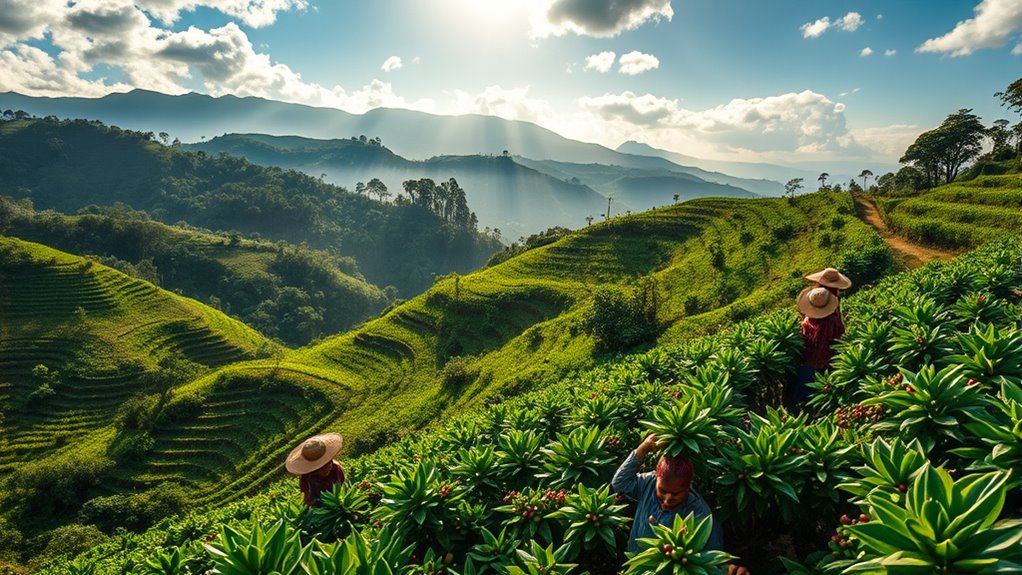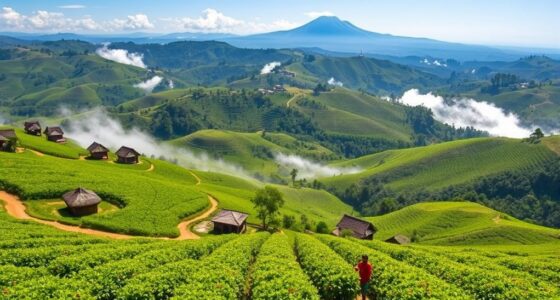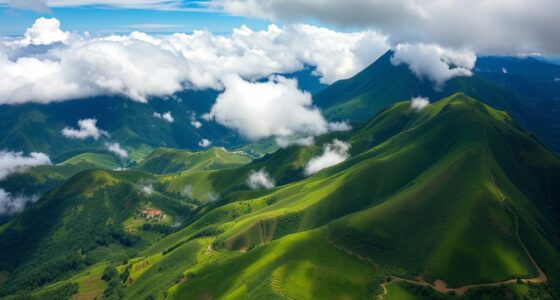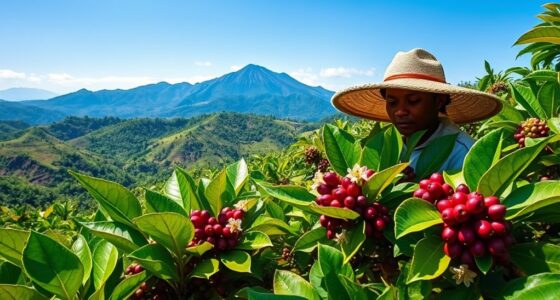If you’re exploring Rwanda’s coffee from Nyamasheke and the Northern Province, you’ll notice it’s renowned for its high-altitude climates, volcanic soils, and meticulous farming practices that produce vibrant, flavorful beans. Smallholders handpick ripe cherries and use eco-friendly methods, supporting sustainable growth and premium quality. These regions’ unique conditions and innovative techniques help Rwanda maintain its reputation in the global specialty coffee market. Continue exploring to discover how these factors create the exceptional coffees you enjoy.
Key Takeaways
- Nyamasheke and Northern Province benefit from high-altitude, volcanic soils that enhance coffee flavor and quality.
- Smallholder farmers in these regions use organic and sustainable practices to produce premium coffee beans.
- Rwanda’s coffee industry in these areas supports export growth, rural employment, and economic development.
- Innovative cultivation techniques and quality control ensure Rwanda’s coffee maintains a global reputation.
- Most exports are shipped via Kigali International Airport and ports, emphasizing strategic infrastructure investments.

Rwanda is renowned for producing some of the world’s finest coffee, renowned for its vibrant flavors and high quality. When you visit the Nyamasheke district or explore the Northern Province, you’ll quickly see how this reputation is built on dedicated coffee farming that emphasizes quality and sustainability. Coffee farming in these regions thrives because of the favorable high-altitude climate, rich volcanic soils, and the meticulous care farmers put into cultivating each plant. Smallholder farmers often handpick ripe cherries, ensuring only the best beans make it to processing. This attention to detail is what elevates Rwanda coffee on the global stage, making it highly sought after in international markets.
Rwanda’s high-altitude, volcanic soils and meticulous farming make its coffee world-renowned.
As you observe the coffee farms, you’ll notice how local farmers have adopted innovative practices to boost yield and quality. They often use organic fertilizers and natural pest control methods, preserving the purity of their coffee. This sustainable approach not only benefits the environment but also enhances the flavor profiles of the beans, which are known for their bright acidity, floral aroma, and complex taste notes. The coffee produced here is so exceptional that it commands premium prices when it reaches the international market. This, in turn, fuels the coffee export industry, which plays a fundamental role in Rwanda’s economy.
When you think about coffee export, you should understand how essential it is to the livelihoods of many farmers and the national economy. Rwanda’s coffee export has grown markedly over recent years as the country’s reputation for specialty coffee has solidified. Exporters work closely with farmers to ensure quality standards are met, often providing training on processing and grading to maximize the value of each harvest. You’ll find that most coffee exports leave through Kigali International Airport or the busy ports, heading to premium markets in Europe, North America, and Asia.
The government and private sector collaborate to enhance Rwanda’s coffee export capacity by investing in infrastructure, quality control, and marketing. This effort guarantees that Rwanda’s coffee maintains its reputation for excellence, opening more opportunities for farmers to sell their beans at fair prices. As a visitor or a coffee enthusiast, you’ll appreciate how this focus on quality and export-driven growth sustains the local economy, creating jobs and supporting rural communities. In essence, Rwanda’s commitment to superior coffee farming and strategic export practices ensures that each cup you enjoy is a product of careful cultivation, expert processing, and a passionate dedication to excellence.
Additionally, the use of specialty coffee techniques by farmers enhances the overall quality and appeal of their beans, helping Rwanda stand out in the global market.
Frequently Asked Questions
What Is the Best Time of Year to Visit Coffee Farms in Rwanda?
The best time to visit coffee farms in Rwanda is during the seasonal harvests, which typically occur from April to June and October to December. During these periods, the weather patterns are favorable, and you can witness the coffee picking and processing firsthand. Traveling in these months allows you to experience the vibrant farm activities, enjoy pleasant weather, and see the full cycle of coffee production in action.
Are There Coffee Tasting Tours Suitable for Beginners?
Imagine stepping into a world of rich aromas—yes, beginner tours for coffee tasting are perfect for you. These tours are designed to introduce you gently to coffee tasting, guiding you through the flavors and processes with ease. You’ll learn the art of savoring coffee, making your experience both educational and enjoyable. No prior experience needed; these beginner tours are your gateway to coffee appreciation and a delicious adventure.
How Do I Get to Nyamasheke and Northern Province From Kigali?
To get to Nyamasheke and the Northern Province from Kigali, you can choose from various transport options like private taxis, buses, or car rentals. Buses run regularly and are budget-friendly, while private taxis offer comfort and flexibility. For a scenic route, consider taking the drive along Lake Kivu or through lush hills, which provide stunning views. Plan ahead to enjoy a smooth, picturesque journey to your coffee adventure.
What Is the Local Culture Surrounding Coffee Farming in These Regions?
You’ll discover that coffee farming in these regions is steeped in tradition and rich rituals. Locals maintain age-old farming traditions, blending them seamlessly with modern techniques. Coffee rituals are more than daily routines; they’re cultural ceremonies that foster community and pride. As you explore, you’ll see how these practices preserve a deep connection to the land, making each cup a reflection of heritage, tradition, and the enduring spirit of the people.
Are There Opportunities to Buy Fresh Coffee Beans Directly From Farmers?
Yes, you can buy fresh coffee beans directly from farmers through farmer markets and coffee cooperatives. Visiting local markets allows you to meet farmers and select beans at their freshest, often at better prices. Coffee cooperatives also offer opportunities to purchase directly, supporting local farmers and ensuring quality. These options give you an authentic experience, connecting you directly to the coffee production process in these regions.
Conclusion
As you explore Rwanda’s coffee regions, imagine each cup as a journey through lush hills and vibrant communities. Just like a skilled barista brings out the best flavor, Rwanda’s farmers nurture every bean with care, turning sun and rain into rich, aromatic coffee. When you sip, think of it as tasting the resilience and passion woven into each harvest—like a story whispered from the mountains to your mug, inviting you to savor the magic of Rwanda’s coffee landscape.









